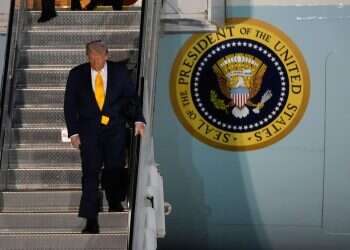A former Israeli national security advisor contends that Iran's network of proxy organizations is unraveling, potentially weakening Tehran's strategic position against Israel. The analysis examines the impact of recent conflicts on Iran's allies and suggests that Israel should capitalize on the current circumstances to neutralize threats and potentially influence Iran's nuclear program.
Iran's Supreme Leader Ali Khamenei recently boasted that "Operation Al-Aqsa Flood has set the Zionist regime back 70 years," marking the first anniversary of the October 7 attack. Yet, while Khamenei tweeted this in Hebrew, his oil minister was busy managing tankers and storage facilities at the Kharg Island terminal, wary of potential Israeli strikes.
From Tehran's perspective, a year into the war, the broader regional picture suggests that its network of proxy organizations arrayed against Israel is beginning to unravel. Although not publicly acknowledged, questions about this strategy are likely already being raised within government circles. The Iranian influence is losing two critical footholds it had established on Israel's borders, while another in Yemen is also suffering significant setbacks.
Furthermore, these proxy organizations have inadvertently become negative ambassadors for Iran. Across the Middle East and beyond, there's a growing recognition that Iranian involvement often brings destruction and instability. Lebanon, Iraq, and Yemen continue to serve as stark examples of this pattern.
According to the latest Harvard-Harris poll, the majority of Americans support Israel over the Islamic Republic in Iran and its terror proxies.
While it's normal to see people on Twitter celebrating the murder of Israelis while saying the most horrific things known to man, don't… pic.twitter.com/hW47R9Y4yB
— Hen Mazzig (@HenMazzig) October 14, 2024
Ironically, the proxy organizations Iran cultivated to avoid direct confrontation with its adversaries are now entangling Tehran in precisely such scenarios. While Iran attempts to distinguish its direct attacks as responses to strikes on its sovereignty or personnel, separate from proxy combat events, these nuanced distinctions are lost in the fog of war.
In the blurred lines between Iran and its proxies, especially with the continued flow of instructions, weapons, and funding, Tehran finds itself being drawn into direct conflict scenarios it sought to avoid. This occurs at a time when Iran's capabilities are constrained, and US support for Israel remains unwavering.
From Israel's standpoint, despite being drawn into this conflict rather than initiating it, the strategic objective is to dismantle the threat Iran has constructed around its borders. This approach aims to weaken both Iran and its regime while exploiting the current circumstances to advance measures to halt Iran's nuclear program.
A Saudi
cartoon showing Israel
prime minister @netanyahu as a surgeon removing Hezbollah cancer from Lebanon
pic.twitter.com/BvwkHPmhv9
— Dr. Eli David (@DrEliDavid) October 14, 2024
The recent Iranian missile attack on Israel demands a response. Failure to exact a significant price could embolden Iran to normalize such attacks and gradually escalate their intensity.
However, Israel need not rush its retaliation. There's strategic value in allowing Iranian nerves to fray during a tense waiting period, permitting the Iranian currency to continue its decline, and giving space for internal criticism of the regime to intensify. Despite differing approaches, coordinating principles with the Americans without overly constraining Israel's options is advisable.
On the public front, there's no need to divulge information about potential targets, objectives, considerations, or timelines. Defense Minister Yoav Gallant's statement that any attack on Iran would be "lethal, precise, and surprising. They won't understand what happened and how" aligns well with the required approach of maintaining ambiguity, preparing for various scenarios, and letting actions speak louder than words.
The primary stated goal for the IDF's operation in Lebanon is to enable northern residents to safely return home. Achieving this requires meeting three conditions: First, eliminating the threat of incursions into Israeli territory by ensuring the absence of tunnels or Hezbollah forces in the border area. Second, neutralizing the threat of anti-tank fire from Lebanese territory toward Israel, requiring the removal of Hezbollah forces from within striking range. The third condition involves maintaining this new status quo over time.
The optimal approach to achieve these objectives is by establishing a buffer zone in southern Lebanon, devoid of civilian presence and under Israeli surveillance and fire control. This "buffer zone" model isn't unique to Israel; Turkey implemented a similar strategy in northern Syria over the past decade to enhance its security, a move that the international community has largely accepted.
From Israel's perspective, although drawn into this conflict, the strategic aim remains to dismantle the Iranian-built threat network, thereby weakening both Iran and its regime, while leveraging the situation to advance measures to halt Tehran's nuclear program.
The IDF's military achievements against Hezbollah thus far have expanded Israel's diplomatic maneuvering room regarding post-conflict conditions. For Israel, the paramount goals are disarming Hezbollah and implementing security arrangements to prevent its rearmament. These objectives take precedence over considerations of stabilizing Lebanon's government or influencing its composition.

In a recent speech commemorating the October 7 attack, Khaled Mashal praised the achievements of "Al-Aqsa Flood." He claimed, "This battle accomplished in one year what years couldn't achieve; even Zionist public opinion has lost confidence in itself." Mashal called for opening "additional fronts against the enemy."
Despite the Israeli security apparatus being fully engaged, there's a growing sentiment that this high-ranking terrorist figure should be prioritized on their target list.
Israeli journalist Zeev Schiff, in "Earthquake in October," wrote, "The Yom Kippur War shook Israel to its foundations. Excessive confidence gave way to doubts. Self-assurance was shaken. Suddenly, long-suppressed questions surfaced: Will we forever live by the sword?"
Five decades later, this question continues to gnaw at the Israeli psyche. While the distant future remains unpredictable, for the foreseeable future, Israel sees no choice but to prevail.




